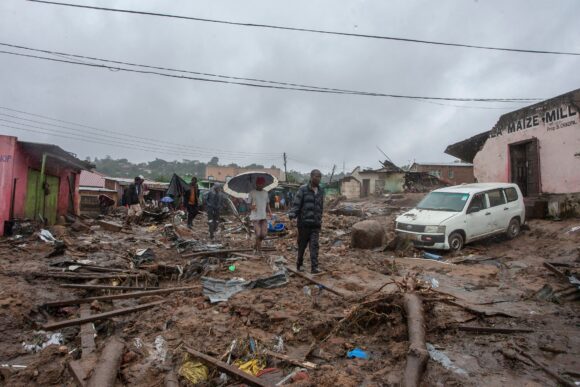Climate change is particularly perilous for small farmers. Warmer conditions are resulting in more damaging bouts of rain and drought, but traditional crop insurance products are often unavailable or financially out of reach.
In Africa, 99% of smallholder farmers are not insured against natural catastrophes. Floods were responsible for roughly 12% of food insecurity in Africa between 2009 and 2020, according to recent research.
To help this population, Floodbase, a New York-based public benefit corporation that specializes in satellite flood tracking, announced Thursday that it and partner organizations will offer parametric flood insurance to small farmers in Malawi and Mozambique by the start of the rainy season this winter.
Its partners include African Risk Capacity, Global Parametrics and the US Agency for International Development, which has awarded the project a two-year grant of $450,000. That grant money was matched by private capital at a 5-to-1 ratio, Floodbase says.
Read More: A Climate Startup Aims to Narrow the Flood-Protection Gap With Data
“We need to catalyze private finance because it is an all-hands-on-deck situation,” said Lindsey Doyle, USAID director of the President’s Emergency Plan for Adaptation and Resilience (PREPARE). The Biden administration launched the PREPARE initiative to spur investment in private-market solutions for developing nations facing the rising ravages of climate change.
Parametric insurance, a niche but fast-growing form of indemnity, works differently from conventional insurance. It’s essentially a bet. Both parties agree to a trigger point — say, 3 inches of rain in an hour, at a specific location. If it rains 2.9 inches, there is no payout. But if the line is crossed, a full payout of a predetermined amount occurs rapidly. There is no loss adjustment process. Fast reimbursement can be critical for families trying to recover from a disaster, helping them avoid dislocation and hunger.
Scarce data has hampered efforts to expand insurance in this part of the world, but Floodbase uses satellite data to make accurate flood predictions and create real-time flood maps, which facilitates insurance planning and enables timely payouts. “Data is no longer a problem,” said Bessie Schwarz, the co-founder and chief executive officer of the company, which last year announced a $12 million Series A fundraise led by Lowercarbon Capital.
The startup has modeled its approach against 2019’s Cyclone Idai, which made landfall in southern Africa and caused $700 million or more in economic losses. It estimates that if a parametric insurance product had been in place at the time, more than 10,000 farmers would have been eligible for a cash payout within days of the event.
Floodbase says it has the financial capacity to reach about 20,000 farmers in the two countries, assuming premiums of less than $10, with payouts limited to $100 (about one-fifth the average annual income in Mozambique). It’s using the first year of grant money with its partners to design the program to be accessible and affordable without government subsidies, so it will be more sustainable in the long term. The final size of the program will largely depend on the price the partners ultimately decide they can charge.
Getting poor farmers to buy in at even a nominal fee may be challenging, so Floodbase is also doing outreach on the benefits of insurance to farmers and to surrounding communities, which can be adversely affected.
Ideally, the program will be a blueprint to expand parametric insurance across Africa, Schwarz says: “We are dedicated to closing the insurance gap in Africa and scaling our approach as broadly as possible.”
Photograph: Storm damage from Cyclone Fredy in Chimwankhunda, Malawi, last year. Photo credit: Amos Gumulira/Getty Images
Was this article valuable?
Here are more articles you may enjoy.



 AIG Underwriting Income Up 48% in Q4 on North America Commercial
AIG Underwriting Income Up 48% in Q4 on North America Commercial  Insurify Starts App With ChatGPT to Allow Consumers to Shop for Insurance
Insurify Starts App With ChatGPT to Allow Consumers to Shop for Insurance  Portugal Deadly Floods Force Evacuations, Collapse Main Highway
Portugal Deadly Floods Force Evacuations, Collapse Main Highway  Florida Insurance Costs 14.5% Lower Than Without Reforms, Report Finds
Florida Insurance Costs 14.5% Lower Than Without Reforms, Report Finds 

